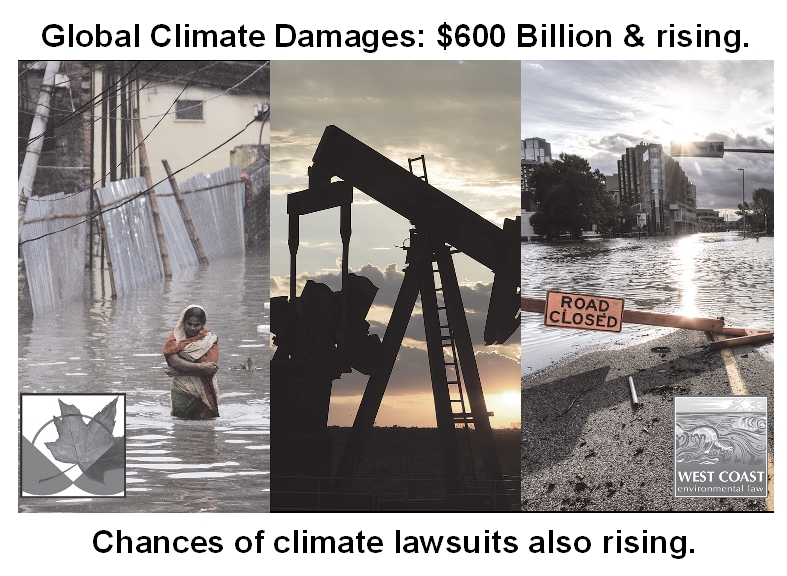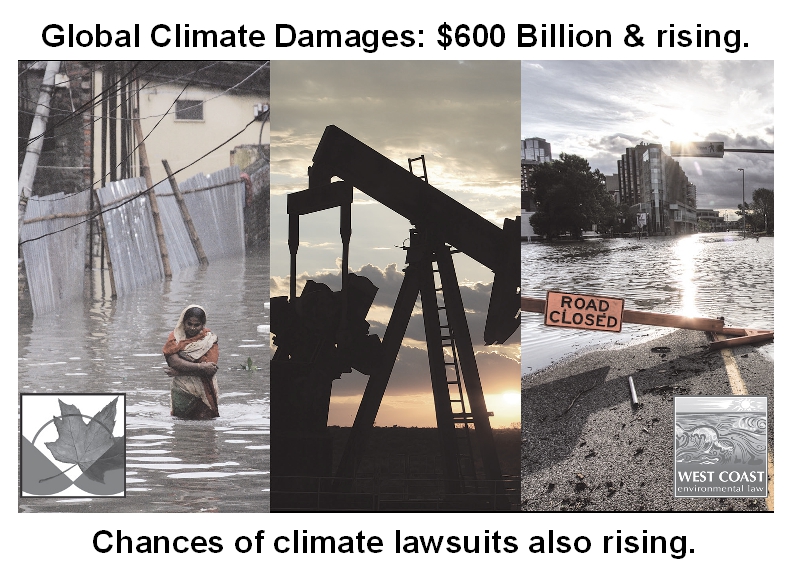
Canada’s largest oil sands companies – has taken the time to read – and publicly disagree with – our recent report, Payback Time. As you may recall, Payback Time examined the risks to Suncor and other Canadian fossil fuel companies of lawsuits brought by the victims of climate change outside of Canada.
 Suncor responded to our report with a blog post entitled “What to do when everyone is the problem” that cleverly attempts to downplay Payback Time as just one of several efforts to single out someone as responsible for climate change. Suncor then argues that we are all to blame, suggesting that singling Suncor out for special blame is simply wishful thinking on the part of equally blame-worthy polluters (ie. the general public).
Suncor responded to our report with a blog post entitled “What to do when everyone is the problem” that cleverly attempts to downplay Payback Time as just one of several efforts to single out someone as responsible for climate change. Suncor then argues that we are all to blame, suggesting that singling Suncor out for special blame is simply wishful thinking on the part of equally blame-worthy polluters (ie. the general public).
Some groups are quick to single out individual countries, based on GHG emissions volumes generated within their borders. Others point the finger at specific industrial sectors which generate significant GHG emissions. Some lay the blame squarely on corporations which produce energy [linking to Payback Time] from fossil fuel sources.
The hard, undeniable truth is that all of us, as fortunate members of the developed world, are complicit when it comes to GHG emissions....
We have heard the message that we are all responsible for climate change over and over again, and at a certain level this is true – but, we are not all equally responsible for climate change.
Suncor’s rhetoric conveniently side-steps questions of who should pay for the damage caused by climate change (and what portion) and whether major greenhouse gas emitters might be held legally responsible for climate change (which was the actual focus of Payback Time).
Producer liability
Suncor argues that fossil fuel companies should not be held responsible because they are not causing the bulk of greenhouse gas emissions – it’s just their product, they aren’t the ones burning/consuming it: “Up to 80 per cent of GHG emissions from each barrel of oil are produced at the point of consumption.” The company makes this point even more clearly in an earlier blog post that accused researcher Richard Heede’s ground-breaking Carbon Major’s report of “scape-goating” fossil fuel companies:
In the study, all GHG emissions resulting from the consumption of the companies’ energy products by consumers and businesses have been erroneously attributed to the companies themselves.
As we’ve explored in previous OSQARs, 70–80 per cent of GHG emissions occur from combusting fossil fuels in our planes, trains and automobiles. In fact, virtually all modern human activity, from mobility to agriculture to heating our homes, results in GHG emissions.
Heede’s study, of course, is quite upfront about the fact that it is attributing the greenhouse gases from burning fossil fuels to the companies that extracted, processed and sold those fossil fuels.
And why not? A fossil fuel company sells each barrel knowing that the vast majority of it will be burnt, and contribute to global warming. Indeed, that’s what Suncorp’s product is – non-renewable, greenhouse gas producing oil.
The law expects the manufacturers of products to be responsible for their products when the product is used in the manner that it’s supposed to be. Tobacco companies didn’t (in the end) escape liability (even from the victims of second hand smoke) by pointing out that it was the individual cigarette smokers that lit up. Asbestos manufacturers didn’t win their cases on the grounds that no one forced people to put asbestos into their homes, thank you very much.
Society as a whole saw jobs created, collected tax dollars and bore at least some of the blame, for the harm caused by both tobacco and asbestos. And yet this did not absolve the manufacturers of responsibility for the damage caused by their product.
So yes, we are all responsible for greenhouse gas emissions, but fossil fuel companies are much more responsible, and benefit financially in a much more significant way, than most of us. While it’s hard to picture a world where no one uses energy products, it’s relatively easy to imagine a world where energy from fossil fuel products plays a much more limited role. We can make insulation without asbestos, and we can produce energy without burning fossil fuels. Incorporating the full costs of producing fossil fuels into the business model for energy companies is a reasonable proposition, and the law of torts offers one pathway to accomplish this.
David Grossman, in his classic 2003 paper, Warming up to a not-so-radical idea: Tort-based climate change litigation, gave several reasons why it is appropriate to hold fossil fuel companies and other large-scale emitters, instead of the users of the fossil fuels:
First, individual consumers such as drivers and users of electricity do not contribute “substantially” to climate change; as such, their small individual contributions would not meet the standards for legal causation.
Second, the degree to which individual consumers maintain real “control” over the harms is debatable. Individual consumers have few meaningful alternatives to fossil fuels and the products that rely upon them.
Moreover, some fossil fuel companies’ efforts to encourage public uncertainty about global warming have compromised the level of consumer knowledge about the risks posed by fossil fuel use.
Finally, tort law’s goal of reducing the cost of accidents would not be furthered by placing the costs of climate change on individual consumers, but rather by holding liable producers who can incorporate the various costs of climate change into the prices of their products.
The reality is that Suncorp’s product and operations are already causing tens of billions of dollars in damages globally, and the company and their share-holders are benefiting financially. The full cost of their product is not reflected in its cost. One cannot keep up that business model and not expect calls for compensation. This isn’t about scape-goating or blaming companies – it’s about equity, making sure that the polluter pays and the practical reality that paying for climate damages is going to cost a lot:
To assume that the GHG polluters will never be called on to pay is to assume that those who suffer are essentially powerless, faceless individuals entirely incapable of holding GHG polluters to account, and that no government or authority will take any action on their behalf, or to recover public costs associated with GHG pollution. … To the extent that those who suffer from climate change have any level of political, legal, military, militant or even moral power then we can expect to see consequences for causing large-scale GHG pollution, as the damages increase and the science improves.
Interestingly, Greenpeace International recently made the same point in a blog post – Payback time for big polluters? – citing our report – Payback Time and our calculations about Suncor’s possible liability. They conclude with a promise: “In the coming weeks we will have more information to share with you about how we are helping people to hold the big polluters accountable.”
The discussion of who should pay for climate change may happen in the courts, it may happen in legislatures or parliaments around the world, or it may happen in international negotiations, but Suncor should not be surprised when it happens.
By Andrew Gage, Staff Counsel
On a related note: My paper on Climate Change Litigation and the Public Right to a Healthy Atmosphere, published last year in the Journal of Environmental Law and Practice (which until recently had an exclusive right to publish it), is now available for free on our website. It describes some legal concepts which might be used if there were a climate damages lawsuit filed under Canadian law for climate damages – including the idea, drawn from water pollution cases, that companies whose operations and product – like Suncor – actually measurably alter the composition of the global atmosphere are contributing enough to be considered a significant emitter – capable of being held liable.